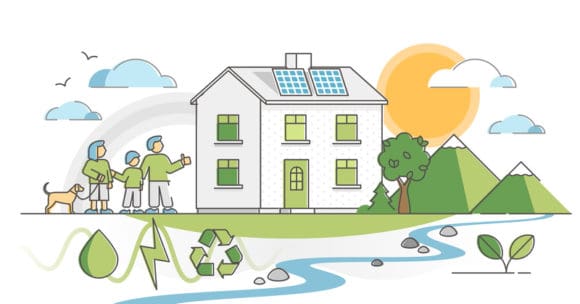By Shorouk Elkobros, IIASA Science Communication Fellow
Assessing energy-related choices and the behaviors of households can help us transition to a low-carbon economy. How can research provide more effective decision-making tools to policymakers for better climate change mitigation policies?
We live at a defining moment for climate change, where today’s actions affect tomorrow’s reality. Every little climate-friendly decision counts. Whether we decide to insulate our houses, put solar panels on our rooftops, or invest in energy-efficient appliances. However, our personal and energy-related decisions vary based on our awareness, age, education, income, energy provider services, social norms, culture, and many other factors. Researchers are starting to pay attention to how this diversity is not well represented in the economic models that politicians use to plan climate change policies.

@ VectorMine | Dreamstime.com
Designing policies inspired by people
Households contribute an average of 70% of global greenhouse gas emissions. Limiting global emissions requires holistic policy approaches that take households’ behaviors and lifestyle decisions into account. Adding such a dimension can potentially upscale low carbon behavioral and social changes to national and global levels, which is fundamental to tackling climate change.
Worried about the future of the planet and motivated to support policymakers in designing better climate change mitigation policies, the authors of a recent study published in the journal Environmental Modeling & Software aspired to build bridges through interdisciplinary research. The study presented a novel interdisciplinary method that aims to integrate households’ energy behavior and social dynamics in climate-energy-economy models and thus help politicians design policies inspired by people.
“I have always been interested in the science-policy-society aspect of mitigating climate change. Climate change is a collective challenge that we need to address together to come up with better solutions for future generations,” notes study lead author Leila Niamir, a researcher jointly associated with the Mercator Research Institute on Global Commons and Climate Change, Berlin and the IIASA Transitions to New Technologies Program.
Better models for a better future
Climate change mitigation policies play a pivotal role in achieving ambitious environmental targets like the Paris Agreement or the Sustainable Development Goals (SDGs). To be able to formulate appropriate mitigation policies, decision makers need assessment tools to measure complex systems quantitatively. In the past decade, a variety of assessment tools have emerged, which have since been predominantly used to support climate change policy debates. In the study, Niamir argues that current assessment models are missing bottom-up and grassroots dynamics, they cannot project realistic variables of what households’ lifestyles and social movement are, and they therefore may not be sufficient to provide reliable information for policymakers.
There is a gap between what policymakers’ current assessment tools can offer and what social scientists and behavioral economists highlight as pro-environmental behavior and climate change mitigation movements. By adding this complex behavior and social perspective to the models, the researchers make it easier for policymakers to design future policies to accommodate different societal behaviors and lifestyles.
Niamir and her team presented a novel method for systematically upscaling grassroots dynamics by linking the best of both “top-down” macroeconomic computable general equilibrium (CGE) models and “bottom-up” empirical agent-based models (ABM). Their approach demonstrates that with computational ABM directly linked to survey data and macroeconomic CGE models, individual behavioral diversity and social influences can be considered when designing implementable and politically feasible policy options.
“We need better assessment tools to quantitatively explore the complex climate-energy-economy system, and reveal the potential of demand-side mitigation strategies. To see substantial changes, we need a mix of external interventions, from soft information policies aimed at raising awareness bottom-up, to financial incentives altering the macro landscape of energy markets and technological transitions. Only modular and integrated models can help policymakers quantitatively explore this complex system and plan for changes in the coming decades,” says Niamir.
Towards a low-carbon economy
We cannot tackle what we do not know. Pathways to a low-carbon economy future entail diminishing the growing discrepancy between mitigation policies and individual and collective behaviors. When redesigning our socio-environmental systems to mitigate climate change, we need to start looking at people as case studies rather than numbers. To transition to a low-carbon economy and accelerate decarbonization, policymakers must adopt novel models that integrate energy consumption, individual behavior, heterogeneity, and social influence into current assessment tools.
In 2019, IIASA and the Research Institute of Innovative Technology for the Earth (RITE), Japan co-organized an international workshop towards improved understanding, concepts, policies, and models of energy demand, where Niamir presented her research and received the young scientist award to continue and extend her research.
“Mitigating climate change indeed requires a massive effort from individual and social movements to advance national and international collaboration. Each individual small step towards shrinking our carbon footprint creates cascading changes in social behavior and consequently mitigates climate change,” Niamir concludes.
Reference:
Niamir L, Ivanova O, & Filatova T (2020). Economy-wide impacts of behavioral climate change mitigation: linking agent-based and computable general equilibrium models. Environmental Modelling & Software 134: e104839. [pure.iiasa.ac.at/16671]
Note: This article gives the views of the authors, and not the position of the Nexus blog, nor of the International Institute for Applied Systems Analysis.

You must be logged in to post a comment.